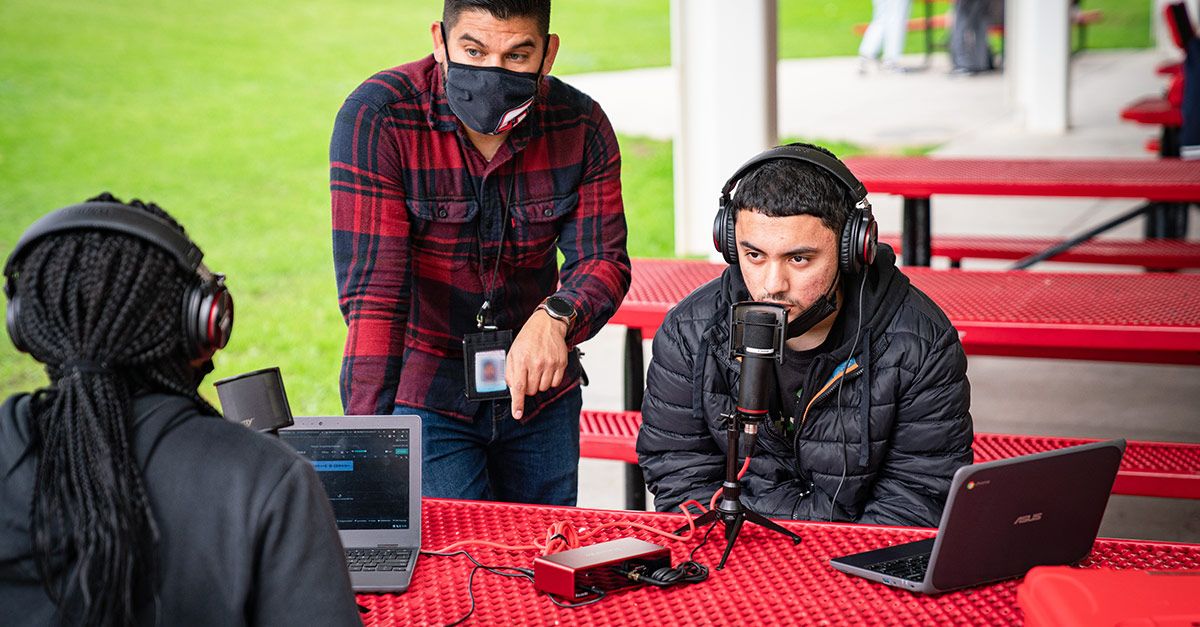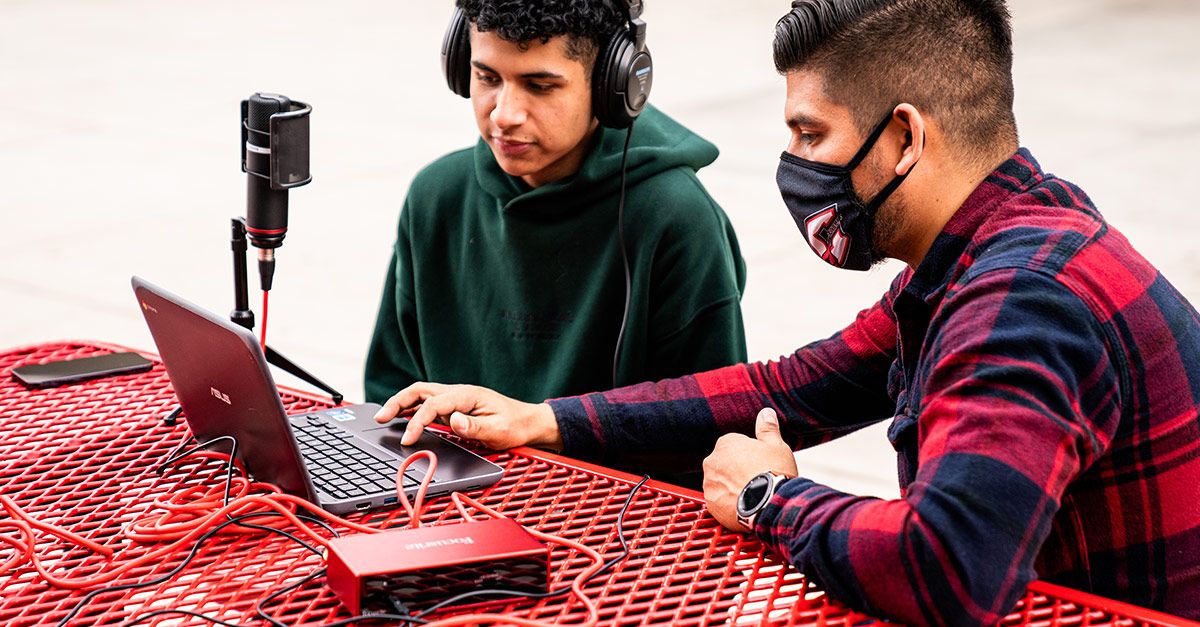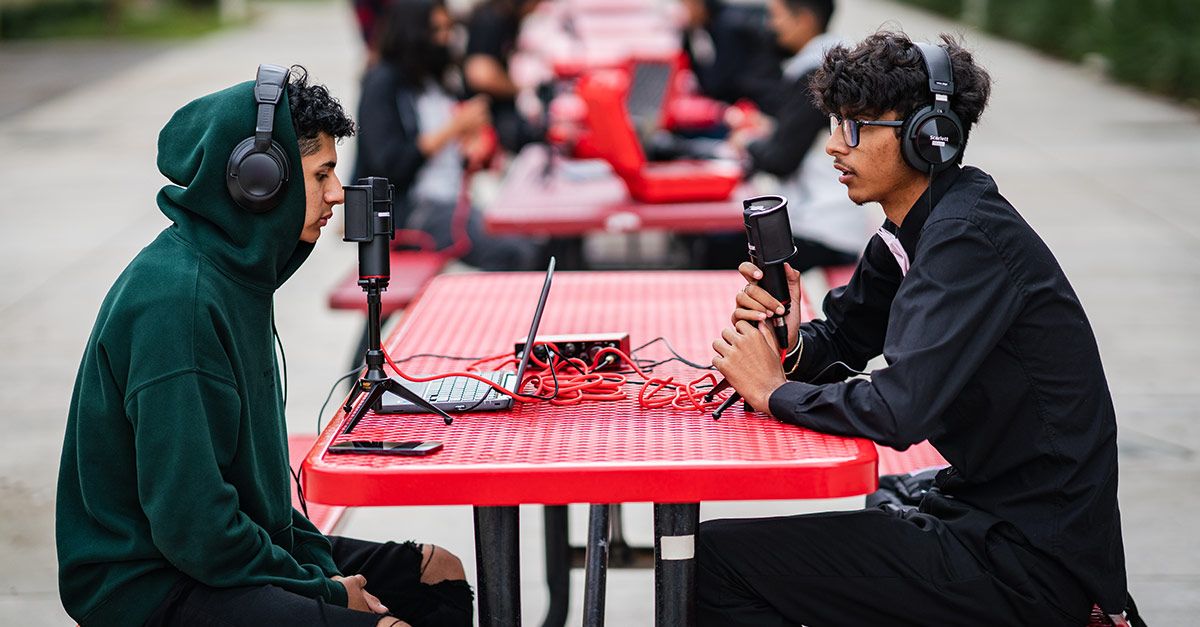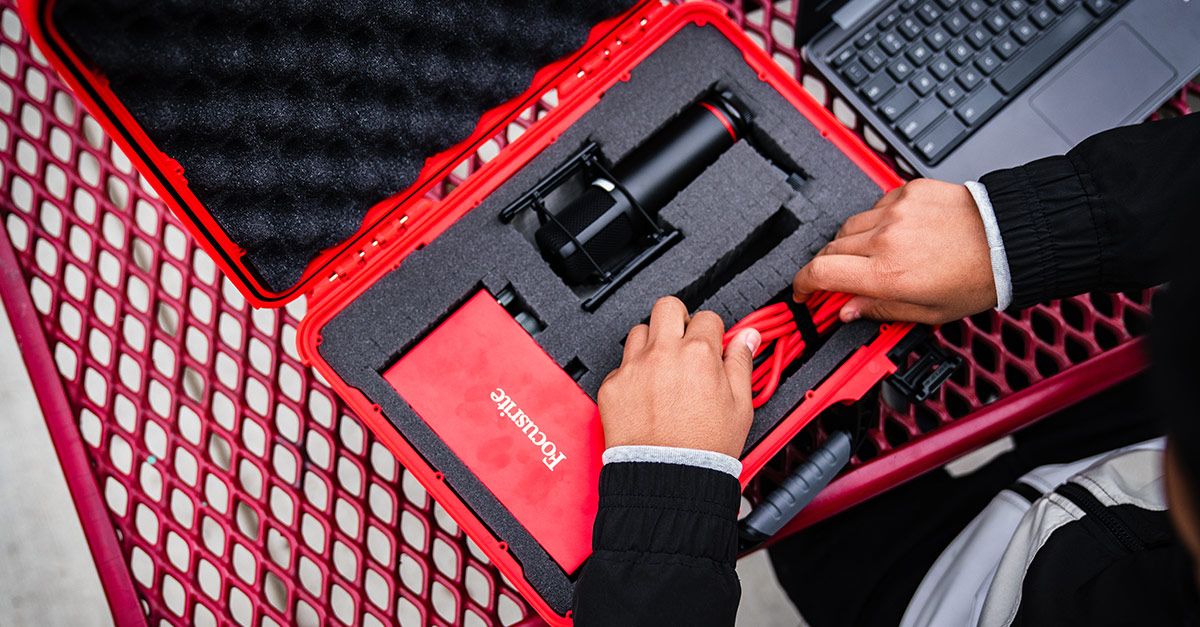Career Tech Ed Students Thrive In Lawndale High School Commercial Music Pathway
Focusrite in Education's "Expert Guide: How to Fund Your Career Tech Program" shared insights into Career and Technical Education (CTE) programs in music and audio engineering programs. We then highlighted Fort Hayes Metropolitan Education Center as an example of these insights in action. Focusrite is proud to feature another exemplary CTE program. Through its knowledgeable faculty and professional-level equipment, Lawndale High School expands students' vision for their future.
Expert Guide: How to Fund Your Career Tech Program

Lawndale High School
Lawndale High School is part of southern California's Centinela Valley Union High School District. Lawndale aims to develop students' critical thinking and interpersonal skills through diverse, culturally relevant, and research-based instructional practices. Lawndale students graduate high school empowered to take ownership of their environment and make positive contributions as global citizens.
Lawndale's Students
Lawndale serves approximately 2,200 young people. A significant number of students receive free/reduced lunch, and a high percentage of students identify as an underrepresented minority. Lawndale is classified as a Title I school that receives financial assistance based on a large population of students coming from low-income families.
Many students and their families don't have the opportunity to see examples of music and audio as a career. Parents/guardians want their children to pursue a stable line of work and encourage them to pursue postsecondary options leading to traditional in-demand career routes. The "starving artist" image also influences how students and their families see the possibilities of music.
For these reasons, students may not always receive the necessary support to continue their musical studies. They may enjoy the program and want to improve at music, but they don't see it as a realistic career option.
Commercial Music At Lawndale
The Commercial Music Pathway is part of Lawndale's visual and performing arts department. The program's mission centers on career preparation through hands-on instruction:
Through the Commercial Music Pathway, students explore various careers and understand careers in the modern music recording and live performance industries. By learning to use music as a communication tool, the pathway teaches students how to utilize sounds to convey specific emotions, understand music theory, and develop instrumental, technical, organizational, and managerial skills.
We focus on a practical and hands-on approach to build proficiency with modern instruments (i.e., drum set, keyboard, bass, and guitar). All courses focus on work-based learning. Through a practical, hands-on instructional approach, the Commercial Music Pathway helps students build competency in popular instruments and gain experience presenting and performing in public.
Commercial Music students finish a comprehensive three-year program. In their first year, they learn basic music theory, the history of recording, and the fundamentals of playing percussion and keyboard. During the second year, students apply music theory concepts to guitar and bass, read lead sheets, and further their understanding of recording and live performance. In their last year, they learn the principles of sound and stage design to plan, produce, and perform at live events.
Students have access to drumsticks, practice drum pads, MIDI drum kits, acoustic drum kits, classical acoustic guitars, steel string acoustic guitars, electric guitars, acoustic bass guitars, electric bass guitars, Studio reference headphones, Chromebooks, BandLab DAW, Launchpad MIDI controllers, Mini Keyboard MIDI controllers, StudioLive32 Digital Live/Recording Mixing desk, Colorsource 40 Lighting Desk, and 20 lighting instruments.

Program Faculty And Support
Luis Rodriguez joined Lawndale in 2011 and has served as Commercial Music Pathway Director since 2017. His background in percussion and technology informs his experience-based pedagogy. When he first started at Lawndale, he taught instrumental music classes, assisted the film program, and helped students set up the school's theater. "Moving through those different roles helped me gain respect. I had to show that I could improve things. My work [with Commercial Music] now helps me defend why the program should receive funding."
As director of the program, Mr. Rodriguez seeks to "make music as accessible as possible for students and meet them where they're at." Rather than limiting the program to students who display innate talent or immediate interest, he seeks to engage as many young people as possible. "In some cases, students who say they don't have an interest show themselves to be incredibly expressive through creating musical loops or using Novation Launchpad and Launchpad Mini," notes Rodriguez. From there, his primary role is to maintain discipline and rigor so students can learn the technical skills and theory needed to develop as artists.
Art teacher Leticia Rojas recently took on the special assignment of CTE Pathway Specialist at Lawndale. She supports Mr. Rodriguez with curriculum refinement as well as setting and achieving yearly goals. “Luis brought the connections to make those opportunities possible, and I make sure the logistics work so that we can implement those programs," explains Ms. Rojas. “I work behind the scenes to support Luis's show." During the pandemic, Ms. Rojas has pivoted logistics to ensure that Mr. Rodriguez has the equipment he needs to provide physically distanced education to students.
In addition to her own work with the Commercial Music program, Ms. Rojas highlights a network of support that provides both equipment and insight, starting with the school district. “During the shutdown, the district asked us what we needed, and having that support helped us make sure students can take these hands-on, skills-based classes at home." Lawndale's advisory board includes industry partners who share what skills they want to see in future employees, which the program can provide before they join the workforce.
Focus On Practical Skills
Lawndale deliberately adopted the name "Commercial Music" because it refers to the commerce of music: music exchanged in a professional setting that requires a broad array of skills. The name reinforces music as a viable educational option leading to a steady career. Several higher education institutions have also adopted the term.
When Mr. Rodriguez first joined Lawndale five years ago, state visual and performing arts standards guided the Commercial Music Pathway. Visual And Performing Arts (VAPA) standards focus on theoretical skills such as sightreading and hearing intervals.
As a CTE teacher, Rodriguez knew the program needed to extend into practical aspects. This meant a more process-driven curriculum based in work-based outcomes and demonstration of applied skills. Rodriguez rewrote the program's curriculum so there would be no loss in theoretical skills—only a gain in applied skills. He also restructured the curriculum to allow students to move from basic skills to gradually more advanced projects.
"The theory is still there, but it's not as technical as a standard VAPA course," explains Rodriguez. "It's more about understanding terms to apply them in a real-world setting. Just like a woodworker need to know what 'dovetailing' means or when to use chisel versus a saw, music is also a trade where you need to know the terms and tools."
In music production, a large part of learning the trade has to do with the technological resources in front of students. Both Rodriguez and Rojas are impressed by the equipment students get to work with at Lawndale. They credit their district for making an investment that allows students to learn on industry-standard equipment.

Emphasize Student Accomplishments
For Rodriguez, it's crucial to keep giving students a "light at the end of the tunnel." Students start with a narrow view of the music industry based only on performance. At Lawndale, they learn about technology, audio engineering, music products, and other elements that create a performance. Students frequently put on concerts and plan afterschool events that integrate all of these elements and provide a tangible outcome.
Starting with the class of 2014, Lawndale has produced "Lawndalepalooza," an end-of-the-year concert including all aspects of live performance. Students look forward to performing and contributing on a technical level behind the scenes. This concert allows students to transfer what they learn in the classroom into a large theater while demonstrating to the public—including their families—that they acquired a set of skills and excel at what they do. They're also creating an enjoyable experience for their community.
Other student-produced events include "Anthems of the Art," a virtual district alumni concert. Lawndale students created and distributed promotional materials in the community and across social media. Local artists get to showcase their work while students and families witness examples of success in the creative industries.
Broaden Career Outlooks
Rodriguez points out that "every parent wants their child to have a stable and rewarding career, and we also want that for them!" Classes and performances help everyone envision how to turn these students' passion into a career. "We point to the things they accomplish every day. We say to them, 'Look at the devices you're using, the things you've learned, and this show you put on!' It's right there in front of them, but they still have to overcome self-doubt and their family's concerns."
To educate his community, Lawndale has hosted staff from music production company APM to attended classes virtually and discuss their work. Next, Lawndale would like to coordinate digital internships and, eventually, onsite internships at APM's Hollywood offices. Ms. Rojas is also working on creating a master class and internships for next year. Professional partnerships like these are a crucial next step. These relationships provide access to mentorships, internships, and potentially jobs. Industry professionals offer college and career guidance and provide evidence for career possibilities.
Rodriguez would also like to host a career night for students and their families that showcases different roles in the industry. These events can remind parents why their children take these classes and how they can benefit their future. “We need people from the industry to tell these kids, 'You don't need to be the headliner. There's so much more out there for you to do.'"

Sustain Engagement
Maintaining the program's practical approach while broadening students' perspectives proved especially challenging during the pandemic. Attendance and engagement were the initial challenges. Rodriguez began by turning his home into an attractive and engaging YouTube studio. "Kids often have to put up with bad camera angles, poor lighting, and inferior audio. As a media teacher, I have to practice what I preach, so my setup had better be pristine. My online class looks like something on Twitch, so now students say, 'Hey, Rodriguez is doing his stream!'"
With the right presentation to get students in the virtual door and paying attention online, Rodriguez could move on to the "fun stuff": letting students produce outcomes. For example, students would start by just listening to a song and writing down what the music communicated to them. Those reactions allowed Rodriguez to turn the song into a skill-based lesson. After illustrating how to achieve that particular effect or sound, students use a web-based DAW, BandLab, and MIDI controllers to record their own samples. In another project, students sampled different pitches made on household objects and arranged them to create a rhythm pattern.
"With the pandemic, creative people still need to create. To do that, we needed to learn how to use modern tools that solve modern problems." To maintain a work-based approach, the program uses Chrome-based DAW BandLab as a personal recording studio. "Students and teachers all feel like we're swimming against the current, so it's important to find tools that are easier to use but still require thought to create a performance. They don't have to learn the whole instrument, but it still lets them generate something musical that shows them how music-making works."
Lawndale has also partnered with Focusrite to provide the right studio resources. Students in their final year of the program are now piloting Focusrite's Scarlett 2i2 Studio alongside the BandLab DAW to record and collaborate on projects remotely.
Excite, Encourage, Inspire
Lawndale works hard to educate students and broaden their perspectives on opportunities ahead of them. "Music shouldn't be just one thing," advises Rodriguez. "Instead of limiting students with narrow standards, they should gain the experience to understand what music means to them."
Students are motivated by the equipment, learning, and possibilities coming their way. These efforts have also made the program a "household name" in the community. What stands out to me is the dedication of these students," says Rojas. "They're excited and involved across so many different levels."
